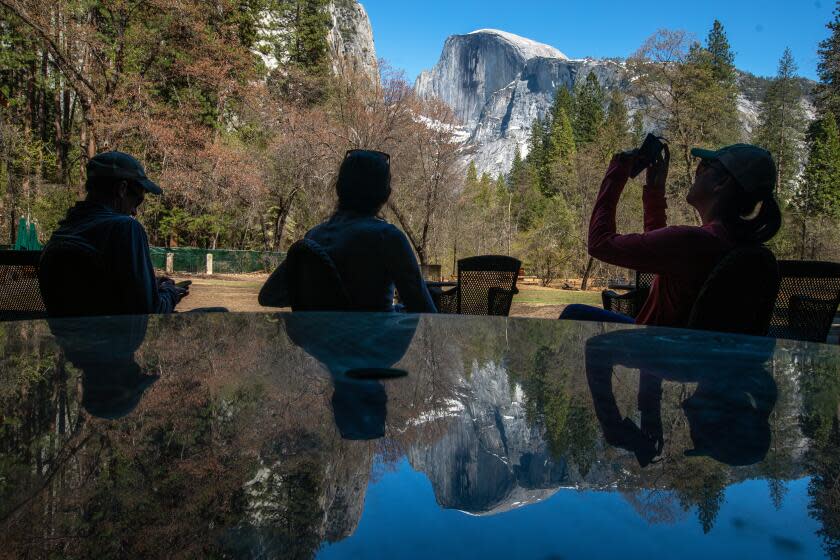'Like sitting on the 101 in L.A.': Yosemite visitors wait in line for hours to enter park

Waterfalls may be flowing freely at Yosemite National Park after record-breaking precipitation, but lines out of the park have often been at a standstill this season — the first summer without a reservation system since before the pandemic.
Employees, visitors and residents are reporting cars parked illegally in traffic lanes, on grass and between rocks, with lines stretching on for multiple hours.
Visitors who arrive later than 8 a.m. on weekends and some weekdays should be ready for a trickier park experience. Those who arrive later won’t find parking and can expect to turn around if they attempt to enter eastern Yosemite Valley, according to the Yosemite National Park Facebook page, which has been providing parking capacity updates. Text updates are also available by texting ynptraffic to 333111.
When first-time visitor Al Malecha headed to Yosemite with her friends for Juneteenth, traffic came to a stop about 80 miles out from Yosemite Valley, she said. At that point, she hopped out of the car, walked around and cracked open a beer.
“You saw lots of other people in their cars doing that too, just because we were idling for so long. I think people’s gas was running really low,” she said. It took her group 2? hours to reach the gate, then another hour to reach parking.
Read more: Melting snow is making Yosemite's waterfalls extra spectacular
Inside the park, Malecha saw red slips of paper adorned on cars wedged in “invented” parking spots. The plan was to use the park shuttles to get around, but reports of lines up to an hour prompted the group to stick to their feet.
Stephanie Rainwater, an employee at Tenaya, a resort two miles from the park, said that at its worst, she has seen traffic stretch past the lodge, blocking employees from getting to work. She noted that’s not a regular occurrence.
“We’re definitely more occupied than last season," Rainwater said. "We’re modifying our tours to leave earlier to prevent some of that congestion there."
This summer holiday season is unique for a number of reasons. Visitors no longer have to make reservations for Yosemite, as has been the case for the last three years — eliciting a mix of reactions.
It also comes on the heels of record-setting precipitation, which recharged the park’s waterfalls to unusually high flows, yet slashed many visitors’ spring plans when flood warnings led to park, road and campground closures.
Read more: Headed to Yosemite? This might ease your drive
The heavy snowpack shut two roads, which remain closed — Tioga Road and Glacier Point Road — forcing cars to cram even more. Starting Saturday morning, Glacier Point Road will reopen through 10 p.m. on the Fourth of July. From July 15 onward, the road will nearly be back to regular use, with 30-minute delays.
A couple other road projects causing 15- to 30-minute delays this past month should be back to normal in July. Big Oak Flat Road and El Portal Road are set to conclude construction, according to the Yosemite National Park Service website.
Beth Pratt, California’s regional executive director for the National Wildlife Federation, has been living and working outside of Yosemite for 25 years. She said that even without trying to enter the park, she and other local residents have been trapped in traffic, just trying to go about their usual business. Put off by the crowds, she’s tried to enter the park only once this season.
“I feel bad for these people. I want people to love parks," Pratt said. "If you come up to Yosemite and it’s like sitting on the 101 in L.A., you’re not going to come back. I want people to love these parks and we want them to have a national park experience — which is not about traffic and no parking.”
The traffic is one matter — but Pratt said her greater concern is how that visitation will affect the park’s wildlife. Before the pandemic, she said she started to see increased environmental damage, from scattered litter and graffiti to park-goers driving on meadows. After the reservation system was put in place, “the park experience went back to being one of what a park should be,” she said.
Read more: The top 10 California experiences you'll recommend again and again
Annual Yosemite visitation rose to more than 5 million people in 2016, then dipped to 2 million to 3 million amid the pandemic in 2020 and 2021, when the reservation system was in place.
As visitation levels return to pre-pandemic levels and demands continue to increase, Pratt said an equitable reservation system will need to be implemented.
“To protect [Yosemite] for future generations, we’re gonna have to start putting some limits," she said. "This is not the park system of even 10 or 20 years ago. There’s way more demand and it’s not just Yosemite obviously. The entire park system, especially the bigger parks, are really grappling with this.”
Last December through Feb. 3, the National Park Service accepted visitor feedback for solutions.
Yosemite spokesperson Scott Gediman said he could not respond to requests for comment.
While this season’s long lines continue, the National Park Service recommends visitors arrive early and stay late, avoid weekends and ride a Yosemite Area Regional Transportation System (YARTS) bus to enter the park.
Read more: Ex-firefighter suspected of igniting devastating fire near Yosemite, could face life term
This story originally appeared in Los Angeles Times.
